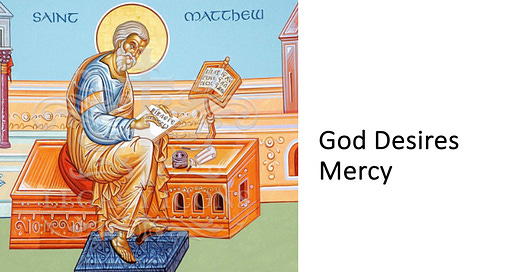Matthew 9:9-13
"He saw a man sitting at the tax booth" (Matt. 9:9). Only the call of five apostles is recorded in the Gospel: Peter, Andrew, James, and John (Matt. 4:18-22), and Matthew. The call of Matthew comes after the healing of a paralytic (Matt. 9:1-8). The One, who has “authority on earth to forgive sins” (Matt. 9:6) demonstrates His power by turning a sinner into an apostle. Thus, there is no limit to Christ’s mercy. If a tax collector can become an apostle and an evangelist, nothing can prevent us from becoming saints.
The call of Matthew inspired other tax collectors and sinners to come to Christ. Jesus, His disciples, tax collectors, and sinners sharing a meal is a powerful image of the Church. After all, we are a community established on the foundation of faith in Christ and the teaching of the apostles, former "tax collectors and sinners" gathered around the Eucharistic meal. Outside are those, who consider themselves healthy and righteous, but neglect "justice and mercy and faithfulness" (Matt. 23:23).
"Those who are well have no need of a physician, but those who are sick" (Matt. 9:12). Jesus, the Divine Physician, came into the world to heal our physical and spiritual illnesses and all the sick come to him: "the tax collectors and sinners were all drawing near to hear him”(Luke 15:1). But the "healthy" did not like it. They did not realize that the words "I came not to call the righteous, but sinners" (Matt. 9:13), also applied to them. When Paul persecuted the church, he considered himself a righteous man (Phil. 3:5-6). But when Christ called him, he understood that among sinners he was "the foremost" (1 Tim. 1:15).
“Go and learn what this means: I desire mercy, and not sacrifice” (Matt. 9:13). The quotation Jesus refers to comes from Hosea: “For I desire steadfast love and not sacrifice, the knowledge of God rather than burnt offerings” (Hos. 6:6). The Hebrew word "hesed", translated as love or mercy, means "a love that gives, love more powerful than betrayal, grace stronger than sin" (St. John Paul II, Dives in Misericordia) that will never pass away (Is. 54:10). Understanding the depth of God's love revealed in Christ (Rom. 8:31-39) allows us to understand Jesus' entire life. He dines with tax collectors and sinners because he loves us.




